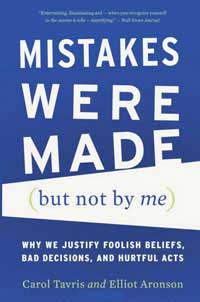 292 pages
292 pages11 CE credits
Course Enrollment
$230.00
Add to Cart
All exams are taken online. The exam for this course will be available in "My Courses" immediately upon enrollment. Note the book is not included.
The book is available for purchase from Amazon.
As an Amazon Associate we receive a rebate from qualifying purchases.
MISTAKES WERE MADE (BUT NOT BY ME)
Why We Justify Foolish Beliefs, Bad Decisions, and Hurtful Acts, 2nd Edition
Carol Tavris and Elliot AronsonHarvest Books, 2008
DESCRIPTION
Why is it so hard to say "I made a mistake" --and really believe it?
When we make mistakes, cling to outdated attitudes, or mistreat other people, we must calm the cognitive dissonance that jars our feelings of self-worth. And so, unconsciously, we create fictions that absolve us of responsibility, restoring our belief that we are smart, moral, and right--a belief that often keeps us on a course that is dumb, immoral, and wrong. Backed by years of research, Mistakes Were Made (But Not by Me) offers a fascinating explanation of self-justification--how it works, the damage it can cause, and how we can overcome it. This updated edition features new examples and concludes with an extended discussion of how we can live with dissonance, learn from it, and perhaps, eventually, forgive ourselves.
The reader will be able to:
• Cite examples of cognitive dissonance
• Describe blindness to pride and prejudice
• Outline the self-justifying processes of memory
• Discuss what the author calls 'the closed loop' of clinical judgment
• Assess the repercussions of self-justification in marriage
• Demonstrate how psychological and emotional wounds can escalate
• Describe the healing process of admitting mistakes
AUTHOR
Carol Tavris, Ph.D., is a social psychologist who lectures and writes on many aspects of psychology. She is the author of several books including Anger: The Misunderstood Emotion, The Mismeasure of Woman and co-author of two leading psychology textbooks.
Elliot Aronson is Professor Emeritus at University of California at Santa Cruz and Visiting Professor, Stanford University. His numerous publications include The Social Animal and Nobody Left to Hate (on the Columbine murders). He was chosen by his peers as one of the 100 most influential psychologists of the twentieth century.
"I will use what I have learned in my personal life as well as with clients."
-Devika Singh, Ph.D.
"Thanks, in part, to the scientific evidence it provides and the charm of its down-to-earth, commonsensical tone, Mistakes Were Made is convincing. Reading it, we recognize the behavior of our leaders, our loved ones, and–if we're honest–ourselves, and some of the more perplexing mysteries of human nature begin to seem a little clearer."
--Francine Prose, O, The Oprah Magazine
"By turns entertaining, illuminating and–when you recognize yourself in the stories it tells–mortifying."
--The Wall Street Journal
"Tavris and Aronson have combined their formidable skills to produce a gleaming model of social insight and scientific engagement. Make no mistake, you need to read this book."
--Robert B. Cialdini, author of Influence: Science and Practice
Every page sparkles with sharp insight and keen observation. Mistakes were made–but not in this book!
--Daniel Gilbert, author of Stumbling on Happiness
"Hypocrisy is hardest to see in oneself. Tavris and Aronson, both social psychologists, demonstrate the whys and hows of this maxim by blending research with anecdotal evidence from celebrities, presidents, and CEOs."
--Psychology Today
ISHK CE at Home
1702-L Meridian Ave., #266
San Jose, CA 95125-5586
This website uses cookies to ensure you get the best experience on our website. Learn more
